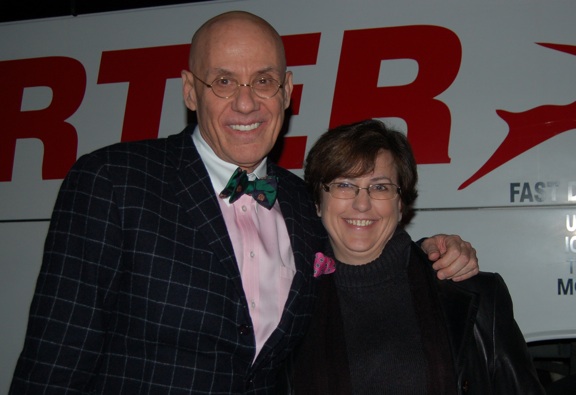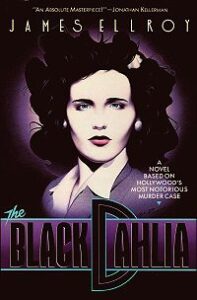 I spent Tuesday night with James Ellroy.
I spent Tuesday night with James Ellroy.
Okay, not all night. Just a few hours with Mr. Ellroy and a group of reporters–plus the talented and extremely nice Stephen Schwartz from my alter-blog, Murderati.
The bestselling novelist of 18 books, Mr. Ellroy is most famous for his bestselling novels THE BLACK DAHLIA and L.A. CONFIDENTIAL. He also has a tragic personal story, as he lost his mother in 1958 to murder.
 We all met at the Langham Hotel in Pasadena for a bus tour for Mr. Ellroy to promote his new television series, “James Ellroy’s LA: City of Demons” on the Investigation Discovery. The purpose was to hold the press captive for three hours to sell the show, while also giving us a tour of some famous L.A. crime scenes. During the drive from Pasadena to Beverly Hills, Mr. Ellroy gave his keynote, a no-holds-barred, vivid, larger-than-life presentation into his past and the upcoming series. He was both arrogant and self-deprecating, an odd combination for a true original, and absolutely entertaining. More than that, he knows what he’s talking about–he’s a walking history book about Los Angeles of the past, and crime in L.A. specifically.
We all met at the Langham Hotel in Pasadena for a bus tour for Mr. Ellroy to promote his new television series, “James Ellroy’s LA: City of Demons” on the Investigation Discovery. The purpose was to hold the press captive for three hours to sell the show, while also giving us a tour of some famous L.A. crime scenes. During the drive from Pasadena to Beverly Hills, Mr. Ellroy gave his keynote, a no-holds-barred, vivid, larger-than-life presentation into his past and the upcoming series. He was both arrogant and self-deprecating, an odd combination for a true original, and absolutely entertaining. More than that, he knows what he’s talking about–he’s a walking history book about Los Angeles of the past, and crime in L.A. specifically.
I probably have no need to justify why I went on the bus–Ellroy+crime scenes=fun. But I also like different adventures because you never know when and where a nugget of an idea will form. So I went with my eyes and ears open, to absorb more than anything.
We drove by several houses where murders occurred and through many neighborhoods, including where Ellroy grew up near El Monte. During the drive, he told story after story–mostly teasers about the show, but all related to the seedy underbelly of L.A.–and answered dozens of questions.
We exited the bus once–in front of Lana Turner’s old house in Beverly Hills. The house where Johnny Stompanato, her lover and abuser, died.
 I can’t retell the story with Ellroy’s signature style, which recounts the public lives and secret scandals of the 50s and 60s L.A. In a nutshell, Stompanato was a brute and a criminal, and he threatened Lana Turner whenever she tried to get rid of him. Lana didn’t take Stompanato out in public–it wouldn’t fit her image–and took her daughter, Cheryl, to the Academy Awards where she won Best Actress for Peyton Place. Apparently, Stompanato was furious about that, and shortly after the awards ceremony had a huge fight. Cheryl, fearful for her mother and herself, took a knife from the kitchen and walked into her mother’s bedroom, where Stompanato was yelling at her. He turned and impaled himself on the knife. The homicide was ruled “justified.” In the Investigation Discovery series, Ellroy interviews Cheryl, now in her 60s, about that night.
I can’t retell the story with Ellroy’s signature style, which recounts the public lives and secret scandals of the 50s and 60s L.A. In a nutshell, Stompanato was a brute and a criminal, and he threatened Lana Turner whenever she tried to get rid of him. Lana didn’t take Stompanato out in public–it wouldn’t fit her image–and took her daughter, Cheryl, to the Academy Awards where she won Best Actress for Peyton Place. Apparently, Stompanato was furious about that, and shortly after the awards ceremony had a huge fight. Cheryl, fearful for her mother and herself, took a knife from the kitchen and walked into her mother’s bedroom, where Stompanato was yelling at her. He turned and impaled himself on the knife. The homicide was ruled “justified.” In the Investigation Discovery series, Ellroy interviews Cheryl, now in her 60s, about that night.
We also stopped in front of Rebecca Schaeffer’s apartment. This young, talented actress was shot to death by her stalker, an obsessed fan named Robert John Bardo, spawning the first anti-stalking laws in California. She was 21 in 1989 when she was murdered. I remember the tragic case vividly–I’m sure many MSW readers do. Bardo’s in prison for life, but Rebecca is dead, and that just doesn’t seem right to me.
 Ellroy himself is a character, and while a lively speaker who loves alliteration (he writes about the series, “You’ll get in-depth interviews with witless witnesses, preening prosecutors, insipid investigators, and jaded jurors”), personally he’s an introvert who doesn’t like crowds, doesn’t own a cell phone or computer, watches no television and few movies, and prefers to be alone in the dark to think and listen to Beethoven. In his words, “Thinking, brooding, planning.” He’s unapologetically conservative and an apologist for LAPD, and emcee of the Los Angeles Police Historical Society’s Jack Webb awards which recognizes supporters of law enforcement. (Yes, Jack Webb is from Dragnet.)
Ellroy himself is a character, and while a lively speaker who loves alliteration (he writes about the series, “You’ll get in-depth interviews with witless witnesses, preening prosecutors, insipid investigators, and jaded jurors”), personally he’s an introvert who doesn’t like crowds, doesn’t own a cell phone or computer, watches no television and few movies, and prefers to be alone in the dark to think and listen to Beethoven. In his words, “Thinking, brooding, planning.” He’s unapologetically conservative and an apologist for LAPD, and emcee of the Los Angeles Police Historical Society’s Jack Webb awards which recognizes supporters of law enforcement. (Yes, Jack Webb is from Dragnet.)
One reporter asked what he loved about Beethoven and Ellroy’s response was quietly passionate, and very earnest–in some ways more real than anything else he’d said in his presentation because it wasn’t an expected question. Beethoven’s music is a gift from God, that became even more amazing as Beethoven became deaf. Akin to a miracle, and I’m sure many would agree. But the eloquence and heart he spoke with told me that Beethoven was his passion, making Ellroy seem, to me, less a showman and more human. And after that everything I’d listened to up to that point took on a more complex and deeper meaning.
 Ellroy, who admits he doesn’t really like people very much, likes the police as a group because they are the only organized group of people who hate the men who prey on women and children as much as he does.
Ellroy, who admits he doesn’t really like people very much, likes the police as a group because they are the only organized group of people who hate the men who prey on women and children as much as he does.
I could go on for another thousand words about the bus ride, but I can’t do Ellroy justice. I will be watching the show, because it’s sure to be over-the-top and fun, while also biting and authentic. I’ll even watch though he told everyone that he’s “over” serial killers stories and doesn’t like them, dashing my hopes of getting a future book endorsement from him. (As long as there are plenty of other readers who still like what I write!)
Several little things stuck in my mind that I’ve been mulling over–tidbits that may find themselves in future books.
The first thing was his comment that events change the focus of investigations. Specifically, that some murders go unsolved because of completely unrelated events that divert the attention of the citizenry. For example, the case of Stephanie Gorman. Ellroy surmised that the case would have been solved had she not been murdered a week before the Watts Riots, which diverted media attention and police attention. He cited a few other cases that fell into that category, and I started thinking about that as well. Crimes before and after 9/11, for example. Or Hurricane Katrina. When the world seems to be falling apart around you, when hundreds or thousands are dead or dying, homeless and sick, how does anyone have the time or resources to focus on just one murder? It truly had me considering a myriad of ideas, just little threads that someday will make sense to me.
 Ellroy is obsessed with understanding misogynistic violence. His mother, Jean Hilliker, who was raped and murdered; Elizabeth Short; other unsolved cases around Los Angeles. As he said, “What moves men to such rage?” Nearly everything he writes about involves, ultimately, the question of Why? Why do people kill? Why do men rape and murder women? Why do they exhibit such rage in the murders?
Ellroy is obsessed with understanding misogynistic violence. His mother, Jean Hilliker, who was raped and murdered; Elizabeth Short; other unsolved cases around Los Angeles. As he said, “What moves men to such rage?” Nearly everything he writes about involves, ultimately, the question of Why? Why do people kill? Why do men rape and murder women? Why do they exhibit such rage in the murders?
The why of crime definitely motivates my writing, and I suspect many other crime fiction writers. We want to understand, we have an almost primal need to understand why people do what they do, especially violence. Because we truly don’t understand, so we’re constantly seeking ways to get it. If we understand, maybe we can stop it. But can we understand the horrid and unspeakable crimes perpetuated on the innocent?
In fiction, we can right wrongs we see in everyday life. We can fight the bad guys and win. We can solve crimes and give justice to our fictional victims, maybe as a little lie to ourselves that we’re really fighting for justice in real life. It’s fiction, but it’s fiction that explores the very best and very worst in people.
 For those interested in James Ellroy’s LA: City of Demons show, it premieres on January 19, 2011, at 10 p.m. on Investigation Discovery.
For those interested in James Ellroy’s LA: City of Demons show, it premieres on January 19, 2011, at 10 p.m. on Investigation Discovery.
What do you think about true crime shows? True crime books? I’m fond of IN COLD BLOOD by Truman Capote simply because it was the first true crime book I read. I’m partial to books about criminal psychology, probably in my search to understand the why of violent crime. What are some of your favorites? Share with the rest of the class and you’ll be in the running for one of two $20 gift cards (to Amazon or BN.com) to celebrate LOVE ME TO DEATH hitting #20 on the New York Times bestseller list!
